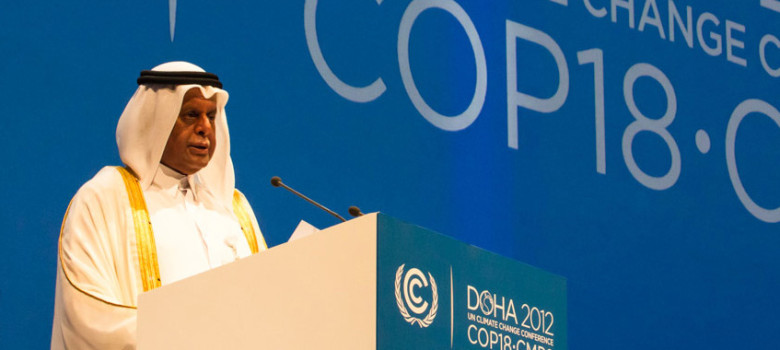
Doha Climate Change
This week, the latest round of UN climate change talks have kicked off in Doha (the capital of Qatar). More than 17,000 participants will gather in the Middle Eastern state over the next two weeks, including our Climate Change secretary Ed Davey.
After the failure to thrash out a new climate treaty during the last few rounds of climate change talks (Copenhagen – 2009, Cancun – 2010 and Durban 2011), the global community is in urgent need of a new treaty to supersede the Kyoto protocol which is due to expire at the end of 2012.
It is likely that the Kyoto protocol will be extended until 2015 acting as a stopgap, when a new, more aggressive climate change roadmap will supersede it.
Issues facing a new climate change protocol
So what kind of issues need to be overcome first before the participating countries agree to extend Kyoto and begin putting in place the framework for a new climate change protocol?
The Global Landscape has changed
One of the major issues facing a new successful protocol is that Kyoto was adopted in 1997, and the world has changed dramatically since then,
Developing countries, which had the option of ratifying the Kyoto Protocol, were not obliged to cut their greenhouse emissions, since they were not seen as the main culprits for the emissions during the period of industrialisation thought to be the cause of global warming today.
Countries like China, India and Brazil all now play a massive part in contributing to climate change, so these countries need to sign up to make it worthwhile for everyone.
The USA needs to play ball
The USA did sign up to the original Kyoto protocol in 1997, but failed to ratify it, meaning they were not obliged to take any proactive steps to prevent climate change. At the time the US was the biggest producer of CO2 in the world therefore their failure to ratify the original agreement was seen as a major kick in the teeth to environmentalists.
However, Jonathan Pershing, a senior negotiator for the USA at the Doha said
‘Those who don’t know what the US is doing may not be informed of the scale and extent of the effort, but it’s enormous.
It doesn’t mean enough is being done. It’s clear the global community, and that includes us, has to do more if we are going to succeed at avoiding the damages projected in a warming world’
In fact, US emissions have fallen sharply over the last few years since many of their coal power plants have been replaced with gas power stations, however it is absolutely key that the USA sign up to any new agreements and with Barack Obama in power, that looks far more likely (especially when compared to George Bush!).
Developing Nations need a helping hand
When the UK went through the industrial revolution in the later part of the 18th Century, we moved from a manual labour and rural based economy towards machine-based manufacturing. This revolution coincided with massive increases in energy demand and with these increases we also saw a rise in greenhouse gas emissions.
In order for developing nations to become developed nations, they need to undergo a similar revolution, which will see an exponential increase in demand for electricity. It is therefore vitally important that the developing nations have the mechanisms in place that allows them to do this in an environmentally friendly way.
To date, developed countries have delivered $30bn of grants and loans to developing countries, but a ‘Green Climate Fund’ designed to channel $100bn to poor countries has yet to begin operating, which is frustrating.
Doha as a venue
Environmentalists may view the choice of Qatar as the host of the climate talks somewhat ironic. According to IMF data, massive oil and gas reserves have made the country not only the richest in the world (GDP / capita – over $88,000), but also the most polluting. A carbon footprint of over 55.4 tonnes per person, makes it the highest globally; ten times the average.
However, the host of the climate talks, former Qatari energy minister, Abdullah bin Hamad al-Attiyah recognises the opportunity that the conference brings.
‘Climate change is a common challenge for humanity. We must work in earnest for a better future for present and for future generations. We have a precious opportunity over the coming days, and we must make full use of it.’
But a pledge by Qatar to dramatically reduce their carbon footprint may give Mr Al-Attiyah’s comments a little more credence. With 10 hours of sun per day Solar would surely be the logical choice to reduce their reliance on oil for their power.
The Doha Climate talks could (in theory) change the world
More and more evidence points to the fact that the world is warming as a result of greenhouse gases being emitted by human activities. If the changes in weather patterns are anything to go by we need to act now.
Therefore it is imperative that the global community signs up to an accelerated ‘all-inclusive’ protocol that targets climate change at the Doha climate change conference Kyoto has done great things for the climate change cause, helping to raise global awareness, however we need a newer, and more ambitious action plan. Here is hoping that the next two weeks brings in a new dawn for the fight against climate change.












No Comments yet! Be the first one.